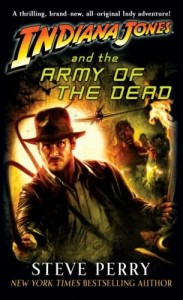Indiana Jones and the Army of the Dead
 Having never read any Indiana Jones novelizations before, I had no real preconceived expectations for Indiana Jones and the Army of the Dead. I read it for one simple reason, really: it was written by Steve Perry, one of my favorite authors and creator of the Matador series (which begins with The Man Who Never Missed). Over the years I have enjoyed all of Perry’s work, including those books he co-wrote with frequent partner Michael Reaves. (For that matter, I’ve also enjoyed work by one of Mr. Perry’s family members — Stephani Danelle Perry, his daughter, who has written several Aliens novelizations, some with her father, and the superb Resident Evil tie-in novels.)
Having never read any Indiana Jones novelizations before, I had no real preconceived expectations for Indiana Jones and the Army of the Dead. I read it for one simple reason, really: it was written by Steve Perry, one of my favorite authors and creator of the Matador series (which begins with The Man Who Never Missed). Over the years I have enjoyed all of Perry’s work, including those books he co-wrote with frequent partner Michael Reaves. (For that matter, I’ve also enjoyed work by one of Mr. Perry’s family members — Stephani Danelle Perry, his daughter, who has written several Aliens novelizations, some with her father, and the superb Resident Evil tie-in novels.)
Let us stipulate from the outset that it is very difficult to create a novel that conveys the same sense of larger-than-life screen action as do the Indiana Jones movies. (As we saw in the somewhat dreadful fourth Indy movie, it’s apparently difficult to do this in a film with any degree of certainty, too.) Perry doesn’t, I don’t believe, try to do that, specifically. Rather, he gets to know the character of Indiana Jones, who by the time of this novel is getting older and is only too aware of it. (In this, there are shades of the thoughtful notes Perry writes in his blog, themanwhonevermissed.blogspot.com.)
The book is set in 1943, after the events of the third movie but 14 years before those of the fourth. Jones is still single and unaware that Shia LaBeouf is his son, which would be a great relief to him if he had omniscient knowledge of it. The plot centers around Jones’ trip to Haiti with not-yet-traitor George “Mac” McHale (who figures prominently in Indiana Jones and the Kingdom of the Crystal Skull), pursuing a legendary giant black pearl, the “Heart of Darkness.”
Because this is Haiti, the area is under the sway of a Bokor, a houngan priest named Boukman. He has prolonged his life using his sorcery, can command small armies of risen corpses, and of course possesses the secret potion used by Haitian voodoo exponents to turn the living into willing slaves. He is at first curious as to why a distant relative of his, the beautiful Marie Arnoux, is helping Jones and McHale. When he realizes what they’ve uncovered — the pearl is a magical artifact of great power — he sets out to take it. Along the way he consorts with various dangerous spirits and lesser gods.
Jones and McHale are also dogged by both Japanese and German agents, as World War II is still going on. It’s clear that author Perry is much more interested in the katana-wielding Japanese officer, a descendant of the samurai, than he is in the somewhat unctuous German team leader. Given Mr. Perry’s background as a martial artist, this is not surprising, and I have to admit that I, too, was more interested in reading about the Japanese villain than the German one.
The pursuing Germans and Japanese soldiers of course meet with various horrible fates in pursuit of Indy and McHale. I’m not giving anything away by telling you that, because that’s how this kind of story works.
Steve Perry’s writing is engaging and recognizable as his. Interestingly, I found the most fascinating character to be the bokor, Boukman, and a great deal of time is spent on characterizing him. Supernatural events and entities are nothing new in the world of Indiana Jones (the awful fourth movie gave us freaking space aliens, for crying out loud). The zombis and their voodoo master are a welcome addition here, giving us something truly dreadful to fear as Jones and McHale engage in a relatively conventional go-through-the-jungle-over-these-creaky-rope-bridges trek to an obvious burial location for the fabled pearl.
Throughout the book, Perry makes an earnest effort to develop further the character of Indiana Jones and to give him interesting villains against which to test himself. There is the obligatory whip work, a supernatural climax, and a fittingly thoughtful ending. Little touches that are the kinds of realistic things one expects from Steve Perry — such as Jones’ rumination on the efficacy of his Webley revolver versus that of the Smith and Wesson hand-ejector he carried previously — remind you who you’re reading, and not just who you’re reading about.
I enjoyed this tale and would read others like it, provided Steve Perry continues to write them. I can recommend it to you, as well.

